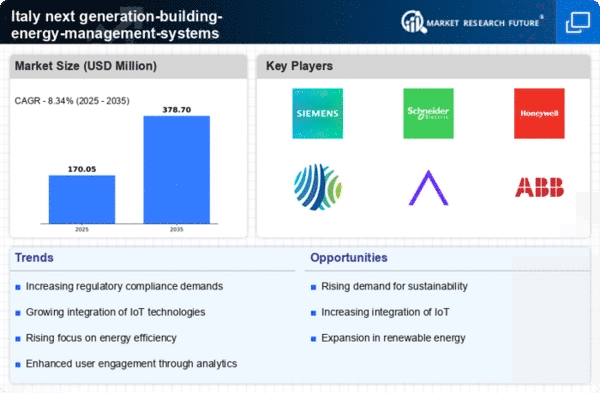Rising Energy Costs
The escalating costs of energy in Italy are driving the demand for next generation-building-energy-management-systems market. As energy prices continue to rise, businesses and homeowners are increasingly seeking solutions that can optimize energy consumption and reduce expenses. The Italian government has reported a 15% increase in energy prices over the past year, prompting a shift towards more efficient energy management systems. This trend is likely to continue as energy costs are projected to rise further, making energy efficiency a priority for many. Consequently, the next generation-building-energy-management-systems market is positioned to benefit from this growing need for cost-effective energy solutions.
Increased Focus on Sustainability
The growing emphasis on sustainability in Italy is a key driver for the next generation-building-energy-management-systems market. As environmental concerns gain prominence, both consumers and businesses are prioritizing sustainable practices. The Italian government has set ambitious targets to reduce greenhouse gas emissions by 55% by 2030, which necessitates the adoption of innovative energy management solutions. This shift towards sustainability is likely to propel the demand for next generation-building-energy-management-systems, as they offer tools for monitoring and reducing energy consumption. The market is expected to expand as organizations align their operations with sustainability goals.
Urbanization and Smart City Initiatives
The rapid urbanization in Italy is driving the next generation-building-energy-management-systems market as cities strive to become smarter and more efficient. With an increasing population in urban areas, there is a pressing need for effective energy management solutions to address the challenges of energy consumption. Italian cities are implementing smart city initiatives that incorporate next generation-building-energy-management-systems to enhance energy efficiency and sustainability. These initiatives are likely to create a favorable environment for market growth, as municipalities seek to leverage technology to improve urban living conditions and reduce energy waste.
Government Incentives for Energy Efficiency
In Italy, government initiatives aimed at promoting energy efficiency are significantly influencing the next generation-building-energy-management-systems market. The Italian government has introduced various incentives, including tax deductions and grants, to encourage the adoption of energy-efficient technologies. For instance, the Ecobonus program offers up to 110% tax deductions for energy efficiency improvements in residential buildings. Such financial incentives are likely to stimulate investment in advanced energy management systems, as property owners seek to capitalize on these benefits. This supportive regulatory environment is expected to enhance the growth trajectory of the next generation-building-energy-management-systems market.
Technological Advancements in Energy Management
Technological innovations are reshaping the landscape of the next generation-building-energy-management-systems market in Italy. The integration of advanced analytics, artificial intelligence, and machine learning into energy management systems is enhancing their capabilities. These technologies enable real-time monitoring and predictive analytics, allowing users to optimize energy usage more effectively. As businesses increasingly recognize the value of data-driven decision-making, the demand for sophisticated energy management solutions is likely to rise. This trend suggests a robust growth potential for the next generation-building-energy-management-systems market as technology continues to evolve.
















